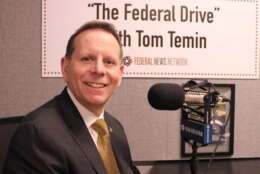Benefits
-
Agencies such as the Department of Veterans Affairs are calling on federal retirees to return to government and help with their coronavirus responses as reemployed annuitants. Thinking of joining them? Here's what you need to know.
April 08, 2020 -
The Office of Personnel Management has given the Department of Veterans Affairs authority to rehire retired federal medical professionals.
April 08, 2020 -
The Thrift Savings Plan millionaires club was going strong before the coronavirus pandemic. Now, it's lost 45% of its members.
April 06, 2020 -
Most Social Security benefits and retirement checks will come as planned. And federal retirees who receive Social Security benefits won't need to file separate forms to receive upcoming coronavirus stimulus checks from the IRS.
April 02, 2020 -
More than 330,000 Army National Guard members can now use the IPPS-A system.
April 02, 2020 -
At least one agency has issued an "evacuation order" for its employees to work from home during the coronavirus pandemic, regardless of their previous telework arrangements. Federal News Network explains evacuation payment authority and what it could mean for you.
April 01, 2020 -
When in doubt, and in all things retirement, start with Tammy Flanagan. She’s been thinking and rethinking your career since the virus hit.
April 01, 2020 -
Service members are feeling more financial pressure as the COVID-19 crisis continues.
March 31, 2020 -
March has been a game-changer for billions of people. The pandemic has produced a variety of mid-life crises for just about every thinking person.
March 31, 2020 -
Childcare is becoming an even bigger issue in the military as COVID-19 spreads.
March 30, 2020 -
In the real world the real heroes, i.e. the people who will literally save our bacon right now, are mostly unknown, faceless bureaucrats.
March 26, 2020 -
Just as VBA was getting its backlog under control and ramping up a whole new congressionally-mandated benefit program, along came the coronavirus.
March 25, 2020 -
Long shot legislation to eliminate or modify Social Security benefits of several million retired federal and public sector employees or their surviving spouses, is almost certainly dead, for now.
March 19, 2020 -
Soldiers can borrow up to $500 a month after a move to help with daycare costs.
March 17, 2020 -
For most of the Postal Service’s 600,000-employee workforce, work continues as usual, but in a heightened state of vigilance.
March 17, 2020















